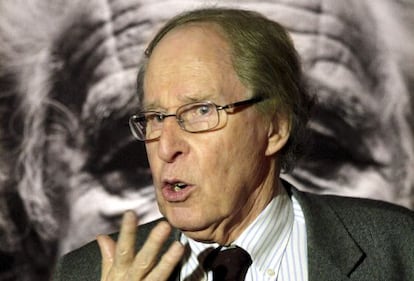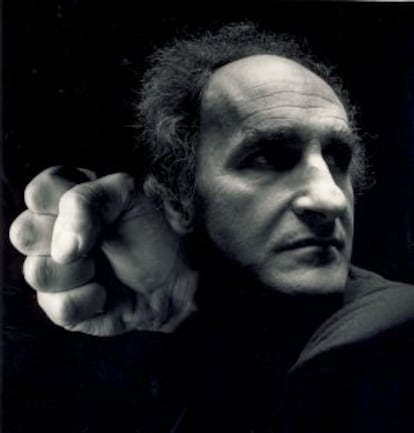“I still have the same enthusiasm”
Alberto Schommer, 85, is dedicating his National Photography Prize win to his wife, who died two months ago His dream is to see his work hang in the Prado

Alberto Schommer is one of those photographers who believes that the best way of telling a story - both that of the person portrayed and that of their social and cultural environment - is with a portrait. It's this way of understanding the genre that is precisely what makes him a worthy winner of this year's National Photography Prize. The jury highlighted his "photography career stretching more than 50 years in which he has not only tackled every theme but also innovated in the medium, both technically and experimentally; bearing witness to the cultural and social transformation of our country."
Schommer received the news of his prize last Friday with barely contained joy and dedicated it to his wife, Mercedes Casla, who died little more than two months ago. "She was my support and constant stimulus and she feared they would forget about me, as they did Oriol Maspons. The prize makes me very happy, but above all for her."
Born in Vitoria in 1928, Schommer has been part of the Spanish photography scene since the tail end of the Franco era, his work appearing in such newspapers as Abc and EL PAÍS, as well as in a hundred books and exhibitions. In that time he has done everything, but he is most proud of the series of psychological portraits he created for EL PAÍS's Semanal Sunday magazine, in which leading figures from the economy, politics and culture agreed to have their portraits taken on meticulously prepared sets.

"I started out at the age of 18 as a painter and a short time after I got married I knew that photography was for me," he explains. "More than 60 years have passed since then and I still have the same enthusiasm and excitement as always."
He names the American-born photographers William Klein and Irving Penn as two of the biggest influences on his work and believes his own "legacy" to young photographers lies in his way of understanding the portrait. "Photography is not something simple and fast. It's not just a simple 'click' and seeing what comes out. The photography that we want has to be thought about and planned a lot. I have to have it perfectly represented in my head beforehand. The camera itself doesn't matter."
I started out at the age of 18 as a painter and a short time after I got married I knew that photography was for me"
Despite that last observation, he admits he almost always shoots on film using a Nikon. "I am always biased toward analogue photography. Digital suits me for a few more or less improvised details. But as I have already told you, I am not one of those who shoots like crazy," he explains.
A 60-year career has proved immensely rewarding, but he is unwilling to single out any one moment. He prefers to hang on to the whole picture, adding that he still has a lot of things left to do. And, at 85 years old, he warns: "I am working on a project that will surprise everyone." Forward-looking as Schommer is, he has already started thinking ahead to the exhibition that comes with the 30,000-euro prize. He would like it to be in the Prado Museum. "I will put up a set of 10 big portraits, two meters high by 80 centimeters wide." And of whom will the portraits be? "Well, that will be a surprise that for the moment I am not planning to reveal," he replies.
This year's National Photography Prize jury was made up of Josep Benlloch Serrano, Catherine Coleman McHugh, Laura Manzano Méndez, Matías Nieto Koenig, Carlos Pérez Siquier, Roxana Popelka Sosa Sánchez, and Begoña Torres. Jesús Prieto, head of fine arts and cultural assets at the Culture Ministry, acted as president. Former winners of the award, which was created in 1994 and is given out by the Culture Ministry, include Cristina García Rodero (1996), Alberto García-Alix (1999), Chema Madoz (2000), Ramón Masats (2004), Gervasio Sánchez (2009) and Rafael Sanz Lobato (2011).
Tu suscripción se está usando en otro dispositivo
¿Quieres añadir otro usuario a tu suscripción?
Si continúas leyendo en este dispositivo, no se podrá leer en el otro.
FlechaTu suscripción se está usando en otro dispositivo y solo puedes acceder a EL PAÍS desde un dispositivo a la vez.
Si quieres compartir tu cuenta, cambia tu suscripción a la modalidad Premium, así podrás añadir otro usuario. Cada uno accederá con su propia cuenta de email, lo que os permitirá personalizar vuestra experiencia en EL PAÍS.
¿Tienes una suscripción de empresa? Accede aquí para contratar más cuentas.
En el caso de no saber quién está usando tu cuenta, te recomendamos cambiar tu contraseña aquí.
Si decides continuar compartiendo tu cuenta, este mensaje se mostrará en tu dispositivo y en el de la otra persona que está usando tu cuenta de forma indefinida, afectando a tu experiencia de lectura. Puedes consultar aquí los términos y condiciones de la suscripción digital.








































